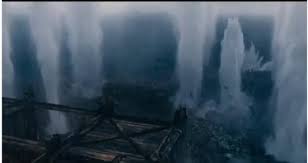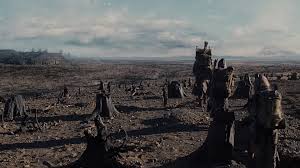After saying in my last post that I would probably wait to see Noah until it comes out on video, I went and saw it anyway because so many people were telling me things like, “Dude, you HAVE to see this movie; it’s epic” etc. So I went with my wife Sue on Saturday.
many people were telling me things like, “Dude, you HAVE to see this movie; it’s epic” etc. So I went with my wife Sue on Saturday.
General comment: IMAX is #$%^ expensive. I almost made Sue wait in the car but she insisted on coming along.
That being said, I loved the movie. Of course, I would say that, seeing how generally heretical my views toward the Bible are, and now with giving this movie a big thumbs up, my journey to the dark side is complete. No more wolf in sheep’s clothing for me.
Let me reiterate. Judging a movie by its trailers or by the opinions of others is the cinematic equivalent of judging a book by its cover. And if you feel that movies about biblical stories need to depict those stories “accurately” (whatever that means), trust your instincts and save your money. Don’t follow along with your iPhone Bible app to confirm how “inaccurate” the movie is. We know that already.
I’ve read some thoughtful reviews out there (though I purposefully avoided reading Darren Aronofsky’s take so as not to influence my viewing experience), and I don’t want to add one more, nor do I want to spoil the movie for those who haven’t seen it. So here are some things that struck me that will hopefully just make you curious. For those who have seen it, please feel free to leave your own thoughts in the comments.
- Noah isn’t really about “Noah” in my opinion, but about issues of life and faith using the biblical story as a jumping off point.
- I like how God is referred to throughout as “The Creator.”
- I also like that God doesn’t speak. Of course, after Alanis Morrisette’s triumphant rendering, how could there ever be another voice of God? But to me, this decision makes the movie more religiously immediate and less cartoonish, since we don’t hear God’s voice either.
- Like the Ten Commandments, the film self-consciously uses some ancient extra-biblical themes–although, as with the use of the Bible, there is no pressure “stick to the script” (see if you can spot the “rock-Ents”).
- A big theme I saw is struggling with faith: “What does it mean to be human, what does God want from us, and while we’re at it, where is God, anyway?”
- The movie is set not in the Middle East, as one might expect, with people wearing sandals and robes, but sort of “anywhere.” I felt like I was on the set of Lord of the Rings, in medieval Europe, or in the Neolithic period all at once–almost as if Darren Aronofsky is trying to tell a story about humanity (duh).

- There’s some good acting in this movie.
- You can see Tubal Cain wearing a welder’s helmet.
- The flood isn’t a bad rainstorm, but the release of the waters of chaos held back at Genesis 1 to return the created order back to its pre-creation state in order to start creation over. This Old Testament scholar thanks you.
- There might be a Virgin Mary thing going on–or at least the common biblical “barren woman” theme.
- Noah is conscious of–even tormented by–his own sinfulness, which is important, I feel, to what Darren Aronofsky is trying to say.
- I feel so bad for Ham.
- Noah’s monologue, where he retells the creation story, is like Genesis 1 meets Cosmos (and not remotely in a Reasons to Believe apologetic kind of way.
- Though there is a “fall” in the movie, the serpent doesn’t seem to be to blame for what happened to Adam and Eve in the Garden (am I right here?). Adam as a more neutral figure is an alternate reading of that story in antiquity, though is largely untapped in Protestant Christian circles.
- Religious zeal almost made Noah do a very, very bad and dumb thing. Moral: Just because you think God is telling you to do something doesn’t mean he is, especially if what you are thinking of doing is stupid. Listen to those around you before acting and let love guide you.
- I think “retributive violence” and “second chances” are the concepts that sum up the heart of the movie for me.
 Here is my elevator pitch: Noah re-presents the biblical story as a complex parable of how human violence (individually and socially/tribally) feeds off of bad ways of thinking about God, and how God can truly be found when we act on mercy, justice, repentance, and forgiveness.
Here is my elevator pitch: Noah re-presents the biblical story as a complex parable of how human violence (individually and socially/tribally) feeds off of bad ways of thinking about God, and how God can truly be found when we act on mercy, justice, repentance, and forgiveness.
Of course, that leaves a lot out, but that gets at what I took out of it.
If anything, the movie might make you go back to the biblical story itself, to read it from other points of view than simply, “See how God is intolerant of sin, enough to kill everyone.” Maybe there’s more to be seen there than what a literalistic reading allows.
Maybe the biblical flood story is supposed to make us think. If you go with an open mind, the movie certainly will.
